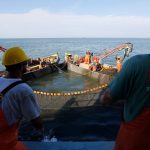Fisheries Minister Phil Heatley leaves on Sunday for an important meeting with Fisheries Ministers and Government representatives from 16 countries around the Pacific, to be held in Niue on 18 and 19 May.
“This is a valuable opportunity to meet with New Zealand’s Pacific neighbours and discuss how we manage the region’s fisheries,” Mr Heatley said.
The Ministerial meeting is being held as part of the 70th annual meeting of the Pacific Islands Forum Fisheries Committee. It will discuss the management of the southern Pacific’s valuable fish stocks, especially highly migratory tuna species.
Pacific tuna fisheries are worth around $3.9 billion every year, making it a hugely significant resource for the region. They are the largest source of export earnings for many island countries and underpin the regional economy.
“Tuna stocks are the most valuable natural resource for many Pacific Island nations. Managing these fish stocks for the long term is vital for economic security and development for the whole region,” Mr Heatley said.
There is concern over the status of bigeye and yellow fin tuna stocks in particular, with the Scientific Committee of the Western and Central Pacific Fisheries Commission reporting that big-eye tuna is over-fished and yellow fin tuna is near the point of being over-fished.
New Zealand companies fish for several tuna species including bigeye, yellow fin, albacore, skipjack and Pacific blue fin. These tuna species occupy large areas of the South Pacific Ocean, passing through the waters of many Pacific countries as well as the high seas (areas outside the fisheries waters of any country).
“Tuna species range over vast areas of ocean. If we want to ensure these fish will still be there in years to come we need to work with all the countries in the region and agree on robust, ongoing management,” Mr Heatley said.
“The countries of the Pacific need to come together and speak with one voice on managing this vital natural resource.”
“We need to strike a balance; we need economic returns now that bolster economic growth and financial security for the region while making sure future generations can enjoy these benefits in years to come.”








